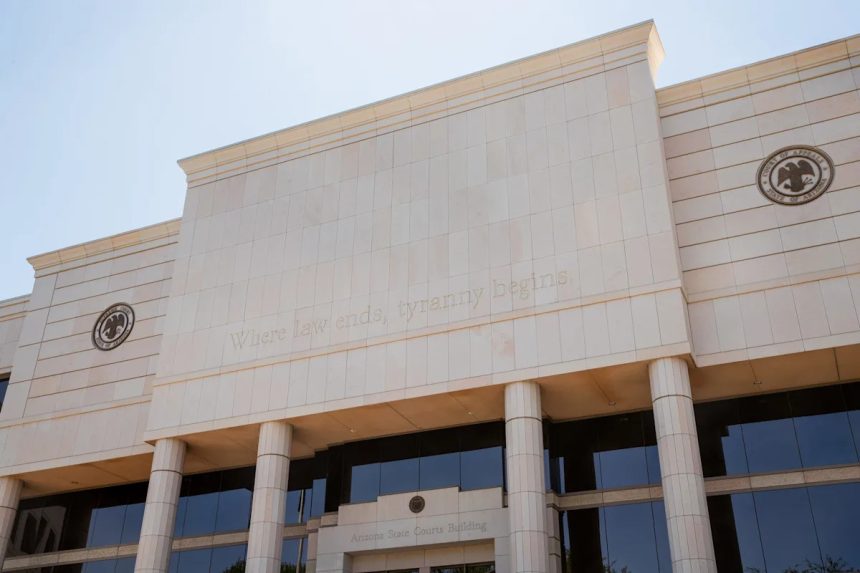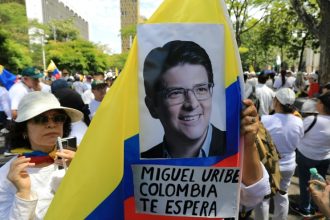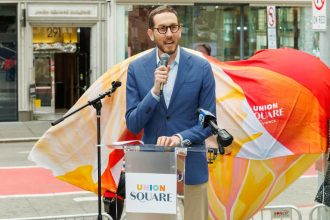The Arizona Supreme Court appeared willing to overturn the state’s popular law requiring people who spend thousands of dollars to influence the outcome of elections to identify themselves.
Considering a challenge to the Voters’ Right to Know Act, the justices expressed concern about potential threats of violence from disclosure, asked whether the law imposed undue burdens on political participation and questioned whether the state’s constitutional framers would have prioritized disclosure above free speech and privacy.
Such questions don’t necessarily portend the outcome of the case and may merely reflect justices testing the limits and weaknesses of arguments.
The law, an effort to rid Arizona elections of so-called “dark money,” was passed by a decisive 72% of state voters in 2022. It aims to eliminate anonymous political spending for donors who give at least $5,000 to groups that spend at least $50,000 on statewide elections.
A full or even partial repeal could significantly affect campaign finance regulation in the state. Challengers hope to replicate the playbook in other states if they are successful.
Overturning the measure would represent a significant loss for the law’s proponents, such as former Arizona Attorney General and Phoenix Mayor Terry Goddard, who spent years advocating for it. It would also undercut efforts by Campaign Legal Center, a non-profit legal organization that advocates for dark-money disclosure laws nationwide. The Center played a critical role in drafting Arizona’s law and has pointed to it as a big success.
The law also is facing another legal challenge from Arizona lawmakers, who have argued it violates the separation of powers. The Arizona Court of Appeals deemed one section of the law unconstitutional, and now the Supreme Court must decide what that means for the law as a whole. An opinion is expected Sept. 29.
The Arizona Supreme Court includes seven justices. Six of the seven were appointed by Republican governors, five from former Gov. Doug Ducey and one from former Gov. Jan Brewer. Justice Maria Elena Cruz was appointed by sitting Gov. Katie Hobbs, a Democrat.
Cruz recused herself and was replaced by retired Justice Rebecca Berch, who served on the high court from 2002 to 2014. Berch was appointed by former Gov. Jane Dee Hull, a Republican.
Court spokesperson Alberto Rodriguez said justices do not have to provide an explanation for recusal.
Attorney David Kolker, defending the Voters Right to Know Act, tells Arizona judges, in one scenario, a nun wouldn’t have an opt-out opportunity to tell a group how she did or did not want her donation used if she donated to a firearms group and then to a pro-choice group.
Does Arizona Constitution value disclosure or free speech and privacy?
Three of the justices — Vice Chief Justice John Lopez and Justices Bill Montgomery and Clint Bolick, all appointed by Ducey — seemed to suggest Arizona’s framers intended to shield anonymous political spending on ballot initiatives and independent expenditures because they did not include such expenditures in the Arizona Constitution.
Arizona’s Constitution only requires disclosure of donors who contribute directly to candidates’ campaigns. The lawmakers who wrote the state Constitution between 1910 and 1912 had initially considered a more expansive mandate to disclose “all contributions … for the purpose of influencing an election,” but ultimately left that out.
“It doesn’t seem like open-ended authorization but rather a very limited directive,” Bolick said.
Independent expenditures are political expenses made for or against an election issue or candidate, but with no coordination for the politician or campaign. Initiatives are laws placed on the ballot for consideration, either by the legislature or through public petitions, that voters then approve or reject.
Attorneys for the state told justices they should take the opposite message. Attorney Eric Fraser said the fact framers made such a mandate about openness for spending on candidates “shows that campaign finance disclosure was a core value of our founders.”
He said the Constitution’s disclosure requirement “does not set a ceiling, it sets a floor.” He pointed also to another provision in the Constitution that bans corporate spending on elections, saying, “This is a pro-disclosure Constitution.”
Alexander Samuels, another attorney for the state, said the framers’ “discussion was, ‘This is a constitution, so we’re merely setting a baseline, and we’ll leave the Legislature to do the rest.'” Suggesting otherwise, he said, “means the Legislature and the people have no discretion whatsoever. That cannot be the case.”
Justices consider threats of violence from political donations
When Bolick asked whether mandatory disclosure was the government forcing someone to say something against their will, Fraser said there were myriad government disclosure requirements, such as those that home sellers may have to make about having pools in their backyard.
Montgomery countered, “None of those disclosures necessarily could result in someone being threatened or intimidated … . There are people who have engaged in speech and they have been threatened, and they have a reasonable fear of being threatened. And it’s not lost on us what happened yesterday.”
Oral arguments took place Sept. 11, the day after conservative political activist Charlie Kirk was assassinated while debating college students on campus in Orem, Utah.
Fraser said there was no evidence that disclosure laws specifically were to blame for any violence, and that instead, violence usually occurred to public-facing leaders of organizations. He said many non-profits publicize their boards of directors, yet those individuals aren’t threatened.
“We have to consider that our founders looked at the risks and benefits of disclosure versus allowing people to remain anonymous, and they chose disclosure,” Fraser replied. “They chose sunlight over darkness.”
Bolick seemed unpersuaded.
“They also chose to protect speech and to protect private affairs,” he interjected.

Then-Arizona Supreme Court Justice Andrew Gould, left, shares a laugh with former Maricopa County Attorney, and current Arizona Supreme Court Justice Bill Montgomery during Gould’s swearing in at the Board of Supervisors Auditorium on Jan 4, 2017. Nick Oza/The Republic
Law’s opt-out provision questioned on multiple grounds
Bolick said the law puts speakers in a position where they have to ask permission before donating to causes they care about.
His question was a reference to a portion of the Voters’ Right to Know Act that creates a process for political donors to get permission to opt-out of disclosure requirements by either a state court or the Citizens’ Clean Elections Commission. It’s for cases where disclosure would pose “serious risk of physical harm.”
Bolick questioned how that didn’t contradict the spirit of the Constitution’s protections for speaking freely and for privacy.
Arizona’s Constitution protects people’s ability to “freely speak.” It’s a right of the public, whereas the First Amendment is a ban on government suppressing the public’s speech.
Chief Justice Ann Timmer and Justices James Beene and Montgomery had also questioned it.
Timmer wondered how far in advance a spender would need to seek permission. Montgomery said he was “concerned” that an administrative agency was given authority to decide questions involving constitutional rights.
Attorney Andrew Gould, a former Arizona Supreme Court justice who represented the challengers, called the provision “unconstitutional” and said it had “no basis in the constitution or Supreme Court precedent.”
Gould’s status as a former state justice didn’t go unnoticed — at one point, Bolick mistakenly referred to him as “Justice.” Gould served on the high court from 2016 to 2021, sharing the bench with several of those whose who sat before him during oral arguments.
Justices question challengers’ injunction request
The challengers to the disclosure law include Center for Arizona Policy, a Christian conservative advocacy organization; Arizona Free Enterprise Club, a libertarian non-profit, and two anonymous individuals. The groups asked the justices to declare the law unconstitutional, or short of that, issue an injunction to exempt the non-profits from the law.
Justices’ questions for Gould mostly revolved around understanding the injunction request, which the non-profits were seeking to block the law from ever affecting them in the future.
“Are you saying that this act as applied to your clients in every instance, for every initiative, every candidate, every potential recall in the future, forever, it would be unconstitutional?” Timmer asked.
Gould said “Prop. 211 … is categorically chilling on speech.” Leaders from Center for Arizona Policy and Arizona Free Enterprise Club said already the law had stifled their ability to collect donations and conduct advocacy work.
Timmer said she could understand an exemption request for a divisive topic but, “It’s difficult for me to say for every possible initiative that comes up, it would be unconstitutional.” Timmer also questioned whether donors to non-profits had a “reasonable expectation” of privacy, which Gould said they did.
Justices do not have a deadline for deciding the case. An opinion is pending.
Taylor Seely is a First Amendment Reporting Fellow at The Arizona Republic / azcentral.com. Do you have a story about the government infringing on your First Amendment rights? Reach her at tseely@arizonarepublic.com or by phone at 480-476-6116.
Seely’s role is funded through a collaboration between the Freedom Forum and Journalism Funding Partners. Funders do not provide editorial input.
This article originally appeared on Arizona Republic: Arizona Supreme Court may overturn ban on anonymous political spending









